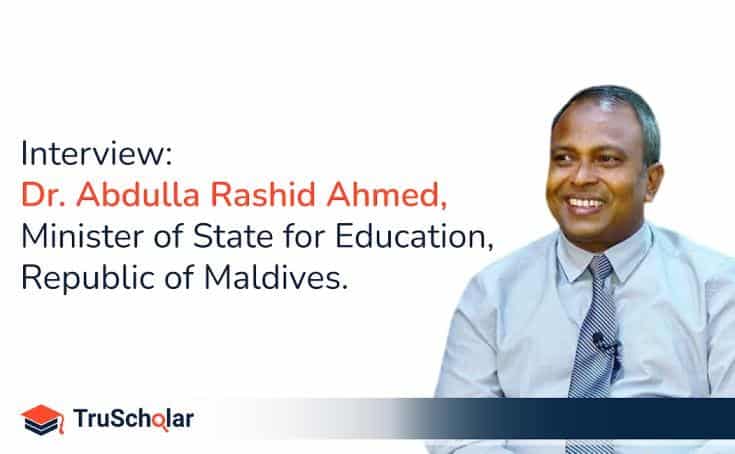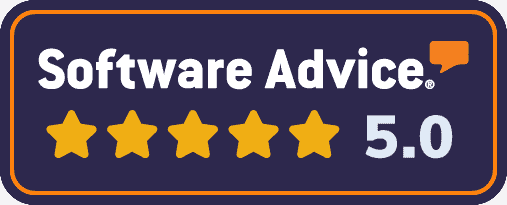Interview chat
“Virtual teaching if conducted effectively, will benefit students,” says Dr. Abdulla Rashid Ahmed, Minister of State for Education, Republic of Maldives.
A few of us at TruScholar, India’s digital credential issuance company, were privileged to engage online with Dr. Abdulla Rashid Ahmed, Minister of State for Education, Republic of the Maldives, where he offered us some pearls of wisdom about various aspects of education.
The Minister shared his profound insights into post-Covid education leadership, micro-credentials, modern teaching methodologies, and the non-negotiable wisdom of being a life-long learner.
On March 26, 2022, India and its key maritime neighbour, had signed an agreement aimed at creating cooperation in the field of education.
Here is the transcript of the interview with Dr. Ahmed.
TruScholar: Covid forced students to stay indoors, creating potentially harmful consequences for them. As the world builds back from the pandemic, how can educational institutes lead from the front to ensure they build a resilient future for students?
Dr. Ahmed: Post-Covid, educational policymakers, principals, and teachers should consider two things. The learning loss experienced by students: for one and a half years, learning was not properly carried out. Schools were closed, therefore, children lost out. Secondly, children had acquired certain knowledge but due to the lockdown and ineffective teaching, there was no revision, so students forgot what they had learned.
To carry out learning effectively, we must ensure that this gap in learning is closed. Without closing this gap, students will find it difficult to make headway in their studies.
So, how do we close this gap?
Firstly, all students must undergo a diagnostic test to help the educational fraternity understand the level of learning loss. Secondly, we need to identify the gaps in learning and implement remedial measures to fill up those gaps. While remedial measures are in progress, we must also measure how successful they are. We must understand that one size does not fit all. The same goes for teaching. So, we must differentiate methods of teaching based on a student’s level of understanding. We need to adopt an individualistic approach to getting students back on track.
The second important thing to safeguard ourselves against future pandemics is not to rely solely on physical teaching and learning. We must practice physical and virtual teaching and learning should blend into the hybrid environment.
Physical classes cannot replace virtual teaching, but virtual teaching if conducted effectively, will benefit students.
TruScholar: Do you see learner recognition through micro-credentials gain momentum in the future?
Dr. Ahmed: Micro-credentials, which focus on recognition of specific competencies are a good thing. Students and teachers benefit from these courses which are short-term, competence-focused, and skills-driven. However, when the goal is generic and long-term, teaching and learning need a different focus. So, micro-credentials, are a temporary concept, that some universities are promoting successfully.
TruScholar: Given your huge experience in the education space could you share your insight into modern teaching methods and modular courses?
Traditional teaching was content-oriented, exam-oriented, teacher-centred, and one-way.
We are now in the 21st century where knowledge is everywhere, available at your fingertips. The best teaching approach in this scenario is project-based learning where students can apply physics or any science, or any core area to a project. The focus is not on teaching individual subjects in isolation. In this approach, teachers will act as facilitators, while students will be the ones creating the knowledge and doing all the work.
Another good approach is inquiry-based learning where the teacher’s responsibility is to develop a very exciting and interesting questionnaire around a subject and students are expected to explore and do the work.
Two other interesting methods of teaching are the engineering and scientific approaches to educating students. The engineering way is project-based where students identify the gaps in society, make a plan, develop a prototype, and test it. The scientific approach is question-based. Students will explore, and collect data, on the latest hypothesis. If the hypothesis proves to be untrue, they will change the hypothesis.
To put it into a nutshell, modern teaching should be activity-based, child-centric, and fun.
TruScholar: A famous physicist is reported to have said, “Once you stop learning, you start dying” and that quote has stayed with us for years. What are your views on this aspect?
Dr. Ahmed: We all should be lifelong learners. Some people mistakenly believe that if they have acquired PhDs or Masters, there is nothing more they should learn. That is very wrong, because knowledge, technology, and the world are changing. So, if we do not change ourselves, we will lag behind. Anybody who wants to be wise and lead a bright life should be a lifelong learner.
TruScholar: What steps has your government to integrate your education system globally?
Dr Ahmed: One of the values of our curriculum is global integration. Students are made to understand that they belong to a local community and a global community as well. So, they should be ready to integrate into a global world.
Click to know more about TruScholar. We are India’s premier blockchain-powered digital credential issuance platform.






